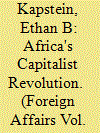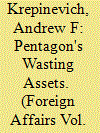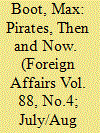|
|
|
Sort Order |
|
|
|
Items / Page
|
|
|
|
|
|
|
| Srl | Item |
| 1 |
ID:
089088


|
|
|
|
|
| Publication |
2009.
|
| Summary/Abstract |
In one of the great ironies of history, Africa may well emerge from the current global recession as the only region in the world that remains committed to global capitalism. While the tired industrialized nations of the West are nationalizing their banks and engaging in various forms of protectionism, Africa remains open for business -- promoting trade, foreign direct investment, and domestic entrepreneurship. Analysts in the industrialized countries are concerned that foreign aid flows to Africa might drop because of the recession, but Africans themselves are much more worried about rising barriers to their exports and diminishing private investment from abroad, which could impede the continuation of the impressive economic progress the continent has made over the past decade.
|
|
|
|
|
|
|
|
|
|
|
|
|
|
|
|
| 2 |
ID:
089087


|
|
|
|
|
| Publication |
2009.
|
| Summary/Abstract |
Over the past three years, Thailand has lived through a military coup, six prime ministers, and widespread civil unrest. The ongoing crisis grabbed headlines last year when protesters occupied two international airports, and it culminated this April in violent clashes in Bangkok. Observers have wondered how what was once such a promising democracy could devolve so quickly.
Today, a semblance of normality has returned to Thailand. But the battle for the country is far from over, and its future remains uncertain. The fractures that led to the confrontation in the first place have yet to be mended. Thai society has become deeply polarized, with different elites jockeying for power and the urban population pitted against the rural population, the north and the northeast against Bangkok and the south, and the poor against the rich. With Thailand's economy now contracting, these divisions might become even more salient. To make matters worse, speculation abounds about the health of the country's 81
|
|
|
|
|
|
|
|
|
|
|
|
|
|
|
|
| 3 |
ID:
089082


|
|
|
|
|
| Publication |
2009.
|
| Summary/Abstract |
After seven years of the Bush administration's neglect and mismanagement of Afghanistan, President Barack Obama was prompt in ordering the deployment of 21,000 more U.S. troops. Over 55,000 U.S. soldiers will soon be on the ground there. The replacement of General David McKiernan with General Stanley McChrystal at the head of U.S. operations in Afghanistan is also intended to increase force projection there. The United States' allies are under pressure to follow suit, if not with combat troops, then at least with training and money. All are concerned about the Taliban's recent success at persuading thousands of young Afghan men to sacrifice themselves to fight the foreign occupation. The Taliban's followers have pushed the Afghan government and its allies out of large swaths of the countryside and crept up to the gates of Kabul, bringing an alternative administration and sharia courts to the vacated areas. The Taliban leader Mullah Muhammad Omar recently offered, ironically, to give safe passage to NATO forces that choose to leave the country, just as the mujahideen offered safe passage to Soviet troops two decades ago.
|
|
|
|
|
|
|
|
|
|
|
|
|
|
|
|
| 4 |
ID:
089079


|
|
|
|
|
| Publication |
2009.
|
| Summary/Abstract |
It is now clear that the global economic crisis will be deep and prolonged and that it will have far-reaching geopolitical consequences. The long movement toward market liberalization has stopped, and a new period of state intervention, reregulation, and creeping protectionism has begun.
Indeed, globalization itself is reversing. The long-standing wisdom that everyone wins in a single world market has been undermined. Global trade, capital flows, and immigration are declining. It also has not gone unnoticed that nations with insulated financial systems, such as China and India, have suffered the least economic damage.
Furthermore, there will be less global leadership and less coordination between nations. The G-7 (the group of highly industrialized states) and the G-20 (the group of finance ministers and central-bank governors from the world's largest economies) have been unable to respond effectively to this crisis, other than by expanding the International Monetary Fund (IMF). The United States is also less capable of making these institutions work and, over the medium term, will be less dominant.
|
|
|
|
|
|
|
|
|
|
|
|
|
|
|
|
| 5 |
ID:
089081


|
|
|
|
|
| Publication |
2009.
|
| Summary/Abstract |
The military foundations of the United States' global dominance are eroding. For the past several decades, an overwhelming advantage in technology and resources has given the U.S. military an unmatched ability to project power worldwide. This has allowed it to guarantee U.S. access to the global commons, assure the safety of the homeland, and underwrite security commitments around the globe. U.S. grand strategy assumes that such advantages will continue indefinitely. In fact, they are already starting to disappear.
|
|
|
|
|
|
|
|
|
|
|
|
|
|
|
|
| 6 |
ID:
089086


|
|
|
|
|
| Publication |
2009.
|
| Summary/Abstract |
The world's attention was riveted in April 2009 when Somali pirates tried to seize the Maersk Alabama, a U.S. cargo vessel delivering relief supplies to Africa. Although the crew was able to fight off the intruders, the pirates seized the ship's skipper, Richard Phillips, and spent the next five days holding him hostage in a lifeboat bobbing in the Gulf of Aden, until U.S. Navy SEAL snipers killed the three remaining pirates and freed Phillips. There was a sigh of relief back in the United States, but it hardly meant an end to the pirate menace. In fact, within two days of Phillips' rescue, pirates had seized four more merchant ships and more hostages.
|
|
|
|
|
|
|
|
|
|
|
|
|
|
|
|
| 7 |
ID:
089084


|
|
|
|
|
| Publication |
2009.
|
| Summary/Abstract |
Brazen assassinations, kidnappings, and intimidation by drug lords conjure up images of Colombia in the early 1990s. Yet today it is Mexico that is engulfed by escalating violence. Over 10,000 drug-related killings have occurred since President Felipe Calderón took office in December 2006; in 2008 alone, there were over 6,000. Drug cartels have begun using guerrilla-style tactics: sending heavily armed battalions to attack police stations and assassinating police officers, government officials, and journalists. And they have also adopted innovative public relations strategies to recruit supporters and intimidate their enemies: displaying narcomantas -- banners hung by drug traffickers -- in public places and uploading videos of gruesome beheadings to YouTube.
|
|
|
|
|
|
|
|
|
|
|
|
|
|
|
|
| 8 |
ID:
089085


|
|
|
|
|
| Publication |
2009.
|
| Summary/Abstract |
Reversing the collapse of U.S.-Russian relations is one of the great tests facing the Obama administration. Among the major powers, Russia is the hard case. And the stakes involved in getting U.S.-Russian relations right are high -- much higher than the leadership of either country has acknowledged or perhaps even realized so far. If the Obama administration can guide the relationship onto a more productive path, as it is trying to do, it will not only open the way for progress on the day's critical issues -- from nuclear security and energy security to climate change and peaceful change in the post-Soviet area -- but also be taking on a truly historic task. One of the blessings of the post-Cold War era has been the absence of strategic rivalry among great powers, a core dynamic of the previous 300 years in the history of international relations. Should it return, some combination of tensions between the United States, Russia, and China would likely be at its core. Ensuring that this does not happen constitutes the less noticed but more fateful foreign policy challenge facing this U.S. president and the next.
|
|
|
|
|
|
|
|
|
|
|
|
|
|
|
|
| 9 |
ID:
089080


|
|
|
|
|
| Publication |
2009.
|
| Summary/Abstract |
Of all the unprecedented things that have happened during the global economic crisis, perhaps the most startling and ominous so far occurred in early 2009: shipping rates between southern China and Europe temporarily fell to zero dollars. As consumer demand in the West dried up and exports dwindled, brokers actually waived the transport fee and only charged a minimal handling cost. By April, hundreds of empty ships, representing over ten percent of the world's cargo capacity, floated idly in Asian waters. After traffic in South Korea's Pusan Harbor, one of the world's busiest, dropped by 40 percent in March, the port ran out of space to store the 32,000 unused containers that had piled up.
|
|
|
|
|
|
|
|
|
|
|
|
|
|
|
|
| 10 |
ID:
089083


|
|
|
|
|
| Publication |
2009.
|
| Summary/Abstract |
Although a great deal has been written about the United States' policy toward Iran, hardly anything comprehensive has been produced about Iran's policy toward the United States. Given Washington's concerns that the United States faces "no greater challenge from a single country than from Iran," as the 2006 National Security Strategy put it, this lack of serious attention is astonishing. What does exist is sensationalistic coverage about Iran's nuclear ambitions and about mad mullahs driven by apocalyptic delusions and a martyr complex. That picture suggests that Iran's policy consists of a series of random hit-and-run assaults on U.S. interests and that its leaders, being irrational and undeterrable, must be eliminated by force.
|
|
|
|
|
|
|
|
|
|
|
|
|
|
|
|
|
|
|
|
|